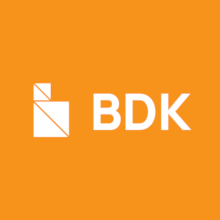28 breaking releases
| 1.0.0-alpha.11 |
|
|---|---|
| 1.0.0-alpha.9 |
|
| 1.0.0-alpha.8 |
|
| 1.0.0-alpha.2 |
|
| 0.1.0-beta.1+stub |
|
#3 in #bitcoin-wallet
11,601 downloads per month
Used in 20 crates
(17 directly)
1MB
22K
SLoC
BDK

A modern, lightweight, descriptor-based wallet library written in Rust!
Project Homepage | Documentation
!! DEPRECATED !!
The bdk library is now deprecated and replaced by bdk_wallet. All projects should migrate to bdk_wallet 1.0.0 or newer as soon as possible. For migration instructions see the "Book of BDK" chapter on "Migrating from 0.x".
The BDK team will continue to publish bdk 0.30.x bug fix releases as needed, but only for a limited time.
About
The bdk library aims to be the core building block for Bitcoin wallets of any kind.
- It uses Miniscript to support descriptors with generalized conditions. This exact same library can be used to build single-sig wallets, multisigs, timelocked contracts and more.
- It supports multiple blockchain backends and databases, allowing developers to choose exactly what's right for their projects.
- It's built to be cross-platform: the core logic works on desktop, mobile, and even WebAssembly.
- It's very easy to extend: developers can implement customized logic for blockchain backends, databases, signers, coin selection, and more, without having to fork and modify this library.
Examples
Sync the balance of a descriptor
use bdk::Wallet;
use bdk::database::MemoryDatabase;
use bdk::blockchain::ElectrumBlockchain;
use bdk::SyncOptions;
use bdk::electrum_client::Client;
use bdk::bitcoin::Network;
fn main() -> Result<(), bdk::Error> {
let blockchain = ElectrumBlockchain::from(Client::new("ssl://electrum.blockstream.info:60002")?);
let wallet = Wallet::new(
"wpkh([c258d2e4/84h/1h/0h]tpubDDYkZojQFQjht8Tm4jsS3iuEmKjTiEGjG6KnuFNKKJb5A6ZUCUZKdvLdSDWofKi4ToRCwb9poe1XdqfUnP4jaJjCB2Zwv11ZLgSbnZSNecE/0/*)",
Some("wpkh([c258d2e4/84h/1h/0h]tpubDDYkZojQFQjht8Tm4jsS3iuEmKjTiEGjG6KnuFNKKJb5A6ZUCUZKdvLdSDWofKi4ToRCwb9poe1XdqfUnP4jaJjCB2Zwv11ZLgSbnZSNecE/1/*)"),
Network::Testnet,
MemoryDatabase::default(),
)?;
wallet.sync(&blockchain, SyncOptions::default())?;
println!("Descriptor balance: {} SAT", wallet.get_balance()?);
Ok(())
}
Generate a few addresses
use bdk::{Wallet, database::MemoryDatabase};
use bdk::wallet::AddressIndex::New;
use bdk::bitcoin::Network;
fn main() -> Result<(), bdk::Error> {
let wallet = Wallet::new(
"wpkh([c258d2e4/84h/1h/0h]tpubDDYkZojQFQjht8Tm4jsS3iuEmKjTiEGjG6KnuFNKKJb5A6ZUCUZKdvLdSDWofKi4ToRCwb9poe1XdqfUnP4jaJjCB2Zwv11ZLgSbnZSNecE/0/*)",
Some("wpkh([c258d2e4/84h/1h/0h]tpubDDYkZojQFQjht8Tm4jsS3iuEmKjTiEGjG6KnuFNKKJb5A6ZUCUZKdvLdSDWofKi4ToRCwb9poe1XdqfUnP4jaJjCB2Zwv11ZLgSbnZSNecE/1/*)"),
Network::Testnet,
MemoryDatabase::default(),
)?;
println!("Address #0: {}", wallet.get_address(New)?);
println!("Address #1: {}", wallet.get_address(New)?);
println!("Address #2: {}", wallet.get_address(New)?);
Ok(())
}
Create a transaction
use bdk::{FeeRate, Wallet, SyncOptions};
use bdk::database::MemoryDatabase;
use bdk::blockchain::ElectrumBlockchain;
use bdk::electrum_client::Client;
use bdk::wallet::AddressIndex::New;
use bitcoin::base64;
use bdk::bitcoin::consensus::serialize;
use bdk::bitcoin::Network;
fn main() -> Result<(), bdk::Error> {
let blockchain = ElectrumBlockchain::from(Client::new("ssl://electrum.blockstream.info:60002")?);
let wallet = Wallet::new(
"wpkh([c258d2e4/84h/1h/0h]tpubDDYkZojQFQjht8Tm4jsS3iuEmKjTiEGjG6KnuFNKKJb5A6ZUCUZKdvLdSDWofKi4ToRCwb9poe1XdqfUnP4jaJjCB2Zwv11ZLgSbnZSNecE/0/*)",
Some("wpkh([c258d2e4/84h/1h/0h]tpubDDYkZojQFQjht8Tm4jsS3iuEmKjTiEGjG6KnuFNKKJb5A6ZUCUZKdvLdSDWofKi4ToRCwb9poe1XdqfUnP4jaJjCB2Zwv11ZLgSbnZSNecE/1/*)"),
Network::Testnet,
MemoryDatabase::default(),
)?;
wallet.sync(&blockchain, SyncOptions::default())?;
let send_to = wallet.get_address(New)?;
let (psbt, details) = {
let mut builder = wallet.build_tx();
builder
.add_recipient(send_to.script_pubkey(), 50_000)
.enable_rbf()
.do_not_spend_change()
.fee_rate(FeeRate::from_sat_per_vb(5.0));
builder.finish()?
};
println!("Transaction details: {:#?}", details);
println!("Unsigned PSBT: {}", base64::encode(psbt.serialize()));
Ok(())
}
Sign a transaction
use bdk::{Wallet, SignOptions, database::MemoryDatabase};
use bitcoin::base64;
use bdk::bitcoin::consensus::deserialize;
use bdk::bitcoin::{psbt::Psbt, Network};
fn main() -> Result<(), bdk::Error> {
let wallet = Wallet::new(
"wpkh([c258d2e4/84h/1h/0h]tprv8griRPhA7342zfRyB6CqeKF8CJDXYu5pgnj1cjL1u2ngKcJha5jjTRimG82ABzJQ4MQe71CV54xfn25BbhCNfEGGJZnxvCDQCd6JkbvxW6h/0/*)",
Some("wpkh([c258d2e4/84h/1h/0h]tprv8griRPhA7342zfRyB6CqeKF8CJDXYu5pgnj1cjL1u2ngKcJha5jjTRimG82ABzJQ4MQe71CV54xfn25BbhCNfEGGJZnxvCDQCd6JkbvxW6h/1/*)"),
Network::Testnet,
MemoryDatabase::default(),
)?;
let psbt = "...";
let mut psbt = Psbt::deserialize(&base64::decode(psbt).unwrap())?;
let _finalized = wallet.sign(&mut psbt, SignOptions::default())?;
Ok(())
}
Testing
Unit testing
cargo test
Integration testing
Integration testing require testing features, for example:
cargo test --features test-electrum
The other options are test-esplora, test-rpc or test-rpc-legacy which runs against an older version of Bitcoin Core.
Note that electrs and bitcoind binaries are automatically downloaded (on mac and linux), to specify you already have installed binaries you must use --no-default-features and provide BITCOIND_EXE and ELECTRS_EXE as environment variables.
Running under WASM
If you want to run this library under WASM you will probably have to add the following lines to you Cargo.toml:
[dependencies]
getrandom = { version = "0.2", features = ["js"] }
This enables the rand crate to work in environments where JavaScript is available. See this link to learn more.
License
Licensed under either of
- Apache License, Version 2.0 (LICENSE-APACHE or http://www.apache.org/licenses/LICENSE-2.0)
- MIT license (LICENSE-MIT or http://opensource.org/licenses/MIT)
at your option.
Contribution
Unless you explicitly state otherwise, any contribution intentionally submitted for inclusion in the work by you, as defined in the Apache-2.0 license, shall be dual licensed as above, without any additional terms or conditions.
Minimum Supported Rust Version (MSRV)
This library should compile with any combination of features with Rust 1.63.0.
To build with the MSRV of 1.63.0 you will need to pin dependencies by running the pin-msrv.sh script.
Dependencies
~12–36MB
~540K SLoC